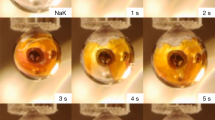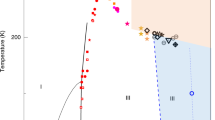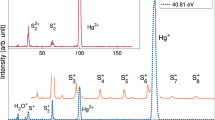Abstract
IT has long been known that mercury vapour is ionised by photons having energies considerably less than that corresponding to the ionisation potential of the mercury atom. Rouse and Giddings1 showed in 1926 that mercury vapour is ionised by its resonance radiation, 2537 A. To explain this effect, Houtermans2 suggested that an excited atom in the 23P1 state of 4·9 volts energy may combine with a metastable atom in the 23P0 state of 4·7 volts energy to form an ionised molecule and a free electron. The energy available for ionisation of this molecule is (4·9 + 4·7) volts plus the heat of dissociation of the neutral molecule, which Winans3 gives from band spectra data as 0·15 volt, making a total energy of 9·75 volts.
This is a preview of subscription content, access via your institution
Access options
Subscribe to this journal
Receive 51 print issues and online access
$199.00 per year
only $3.90 per issue
Buy this article
- Purchase on Springer Link
- Instant access to full article PDF
Prices may be subject to local taxes which are calculated during checkout
Similar content being viewed by others
References
Rouse and Giddings, Proc. Nat. Acad. Sci., 12, 447; 1926.
Houtermans, Z. Phys., 41, 619; 1927.
Winans, Phys. Rev., 37, 897; 1931.
Author information
Authors and Affiliations
Rights and permissions
About this article
Cite this article
ARNOT, F., MILLIGAN, J. Formation of Mercury Molecules. Nature 135, 999–1000 (1935). https://doi.org/10.1038/135999b0
Published:
Issue Date:
DOI: https://doi.org/10.1038/135999b0
Comments
By submitting a comment you agree to abide by our Terms and Community Guidelines. If you find something abusive or that does not comply with our terms or guidelines please flag it as inappropriate.



